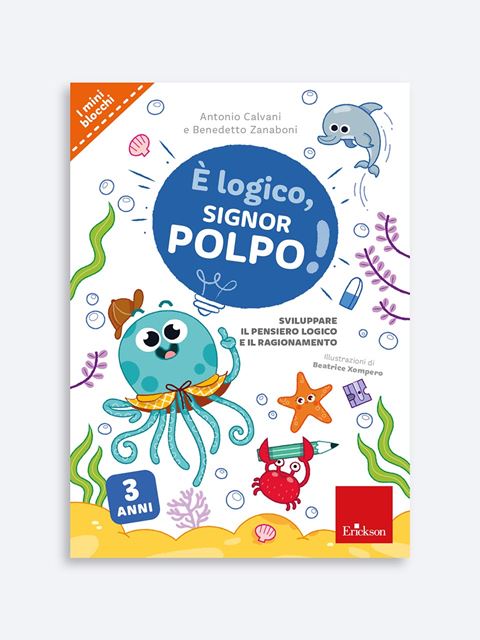 EN
EN
 PT
PT

Develop logical thinking and reasoning

After the previous book The little pirates regarding school prerequisites, and Watch Out… focussing on attention and concentration, That’s logical… is a new series of Mini blocks that are easy to use and carry with you, full of fun educational games designed by education professionals to develop the logical skills of children aged 3 to 6 years.
The activities proposed in each volume are in order of increasing difficulty and can be carried out independently thanks to the minimal page layout and the simple and immediate instructions that make the method of execution explicit for children.
Thanks to its practical format, the block pad is the ideal companion both at home and on the road.
The activities
These books are colorful and engaging workbooks that offer 48 fun activities to develop reasoning and logical thinking in 3 to 6-year-olds, organized into 4 sections of increasing complexity and designed to facilitate the development of 4 fundamental skills:

Visual ability
The training of visual skills from the early years of kindergarten represents an excellent tool for the development of future collateral skills. In these activities you will find completion exercises with missing parts, filling logical blocks according to a geometric design and identifying the wrong components in a visual pattern to be recomposed.

Sorting and classification
The ability to classify and sort from childhood is a good prerequisite for future logical-mathematical skills. The proposed exercises concern the classification of elements according to logical characteristics, of size or color. There are also first set studies activities, which require you to choose the elements to bring together or to identify the intruding elements.

Logical-deductive ability
Logical-deductive skills are directly related to future, all-important, problem-solving skills. The children will carry out activities of completing logical sequences, inserting elements within deductive matrices or reordering elements broken down according to a logical sequence.

Spatial orientation
Through the early spatial orientation activities, the first topological concepts are introduced, fundamental for future skills in the visuo-spatial field: challenges that concern the concepts of inside-outside, above-below. Children will be asked to locate or place elements according to these criteria.
THE VOLUMES IN THE SERIES

That’s logical, Mr. Octopus!
Develop logical thinking and reasoning
In this adventure, Mr. Octopus and his friends will have to solve puzzles and logic games with the help of 3-year-old children. At the end of the proposed sections, young readers will find 4 puzzles which, joined together, will create a great scenario to play with.
Leaf through some selected pages from the book that have been translated into English to facilitate your evaluation:

That’s logical, Mrs. Tiger!
Develop logical thinking and reasoning
In this adventure, Mrs. Tiger and her friends will have to solve puzzles and logic games with the help of 4-year-old children. At the end of the proposed sections, young readers will find 4 puzzles which, joined together, will create a great scenario to play with.
Leaf through some selected pages from the book that have been translated into English to facilitate your evaluation:
THE AUTHORS
Antonio Calvani President of the Scientific Association SApIE (www.sapie.it), former Full Professor of Didactics and Special Pedagogy at the University of Florence and Director of the magazine «Form@re». He is the author of over 150 publications on topics related to teaching methodologies and technologies.
Benedetto Zanaboni He has a degree in Primary Education Sciences and Social Education Sciences. He worked for about ten years as a professional educator in Florence, dealing with disabilities and social problems, and he is currently a primary school teacher in the province of Grosseto. He collaborates with the Scientific Association SApIE and the University of Florence, dealing with teaching, coding and educational technologies.